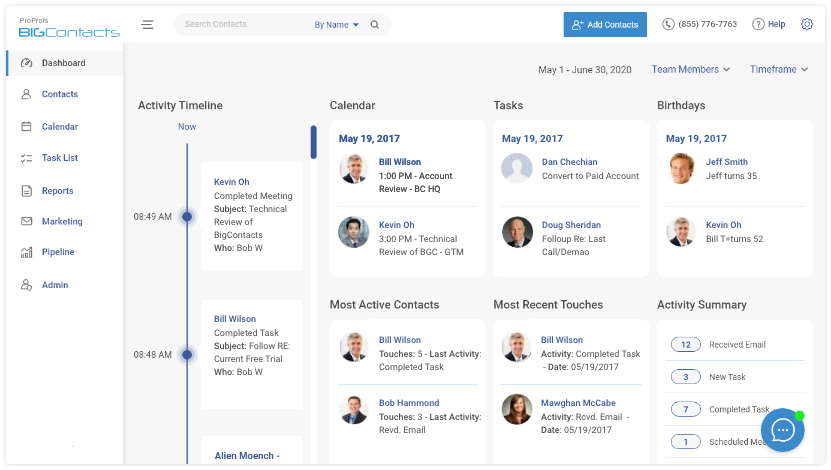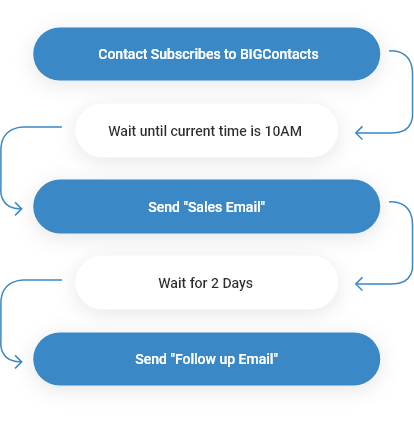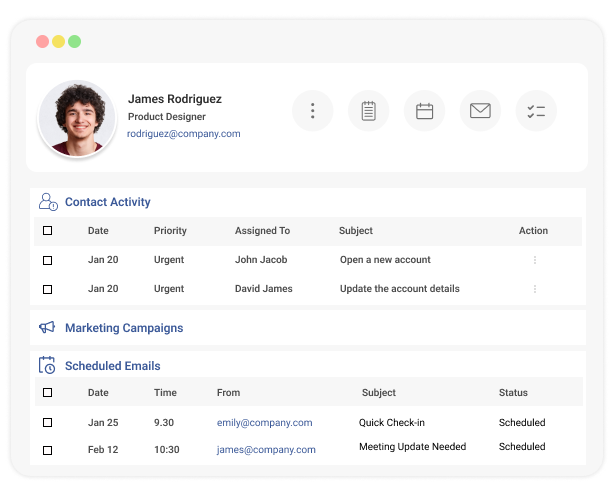It’s non-negotiable to stay organized, efficient and client-focused if you’re willing to run a successful law firm. To keep up with the modern demands of legal practice every day, you can not solely rely on traditional methods as it can make your firm lag. This is where having a Legal CRM (Customer Relationship Management) system becomes necessary. A strong Legal CRM can give you all-rounded solutions to boost productivity, make things run seamlessly, and keep a focus on the client’s side, which are the key ingredients for consistent growth and success.
However, not all Legal CRMs are created equal. Having the right legal software for your law firm is not just about choosing a platform; it is about selecting a system that aligns with your workflows, needs, and goals. Whether it is managing relationships with your clients, tracking progress on legal cases, or streamlining communication, the right Legal CRM can benefit your law firm in various ways.
In this article, I will discuss the 6 essential features that you should look for in a CRM. These features are designed to help your firm optimize its processes, deliver exceptional client service, and unlock its full potential. With the right tools in place, your law firm can stay ahead in a competitive legal landscape while fostering stronger relationships with your clients.
6 Must-Use Features in Your Legal CRM
Ensure to use Legal CRM software that includes important features like:
1. Contact and Client Management System
A legal CRM system is strong if it manages your contact data and client information effectively. It should have all the client information, logs of communications, case history, and much more in one place to allow access to your team in real time.
Further, your legal CRM should be able to provide tools specific to your requirements, like task automation for scheduling appointments, reminders for follow-ups, and management of documents, thus boosting your productivity substantially. It should also provide customizable reporting and analytics features to help you identify trends, measure performance, and make data-driven decisions. Seamless integration with your existing legal software and secure cloud storage is essential for boosting your firm’s efficiency and ensuring data protection.
How to use:
- Centralize data: Make sure to log all the client data into the CRM to have a concrete database. Leverage categories and tags to differentiate the clients based on relevant criteria.
- Track interactions: Import every call and email into the system to create a record of all the interactions for current and future references.
- Leverage alerts: Set reminders for court dates, deadlines, case meetings, etc. to ensure that you never miss any critical task.
2. One-Click E-Signature
One of the biggest challenges of running a law firm is chasing clients to get signatures, and at the same time, one of the most critical ones. Legal software with the feature of e-signatures can make your life easier with less turnaround time, be more convenient for clients, and be a very secure way of authenticating important legal documents. It eliminates the hassle of printing, scanning, and mailing documents, allowing lawyers to focus on more pressing tasks.
Additionally, it enhances document tracking, reduces errors, and ensures compliance with legal standards. This efficient solution not only saves time but also fosters stronger client relationships by demonstrating professionalism and adaptability.
How to use:
- Integrate e-sign functionality: You can upload contracts directly and enable e-signature requests within the CRM.
- Analyze document status: Within your legal CRM, you can check signatures for which agreements are pending, signed, or overdue and send reminders to clients when required.
- Streamline communication: Ease communication by sending documents electronically to your clients, mitigating the need for in-person meetings or physical papers.

3. Automated Text, Email, and Video Messaging
Exceptional client service means meeting clients where they are—on their smartphones. Having said this, it has also been reported that 90% of the clients prefer texts to communicate with a business, and 66% agreed that short videos help them understand the services better.
These features in your legal CRM can help you engage leads through text, emails, and video. Whether it’s reminders, updates, or personalized check-ins, automated messaging saves time while maintaining a personal touch.
How to use:
- Automate workflows: You can create templates for common messages related to appointments and automate their delivery based on triggers like court dates or document filing deadlines.
- Leverage video messaging: Try customizing video messages for major updates to explain complex legal concepts. This fosters trust and promotes better client understanding.
- Monitor engagement metrics: You can analyze open rates and response time for your email and text campaigns and improvise your strategies as needed.
4. Advanced Dashboard Analytics
If you’re aiming to make your law firm profitable and successful, then being data-driven is a must. Your legal CRM must offer detailed reports on various metrics such as client acquisition, case outcomes, revenue, and staff performance. This data will help your law firm make informed decisions by identifying trends and unveiling areas of opportunities and improvement.
A strong legal CRM can also help streamline operations, improve client satisfaction, and optimize resource allocation. With this data, you can identify inefficiencies, track your firm’s growth, and create strategies to stay ahead in the legal market. Proactivity with analytics ensures long-term success.
How to use:
- Track performance: Through analytics, you can track the performance of your law firm by identifying common patterns or trends. For example, you can focus on cases with extended timelines and address potential challenges.
- Personalize dashboards: Perform customizations to your dashboard and better understand the metrics most relevant to your firm, such as open cases, case outcomes, or staff performances.
- Generate reports: Leverage CRM’s reporting tools and create professional reports to showcase to your clients.
5. Marketing Management Tools
Ensure that your legal CRM supports marketing operations that help develop and recruit clients for your company. Specifically, look at software supporting social media or email integration, which help you effectively achieve your target list and generate follow-ups as well.

Besides this, your legal software should provide insights into client engagement and interaction so your law firm can identify opportunities for upselling or cross-selling services to your existing clients. An effective CRM can also provide analytics to measure the effectiveness of your marketing efforts, track client acquisition costs, and help refine your strategies. These features ensure your firm remains competitive and client-focused.
How to use:
- Create targeted campaigns: you can create targeted campaigns by segmenting your clients and crafting tailored marketing campaigns based on client demographics, case type, or interests.
- Streamline activities of social channels: You can manage and schedule your social media posts across different platforms directly from your legal software. This ensures consistency and timely communication with your audiences.
- Monitor the performance of the campaigns: Tracking performance to see whether or not your strategies are working perfectly is a must. You should monitor metrics such as client conversion and click-through rates (CTR) to evaluate the success of your campaigns.

6. Software Support
Learning and adopting new software can be an exciting opportunity for growth, but it may also leave your team feeling uneasy or overwhelmed—especially if they’re navigating the process alone.
Fortunately, a well-designed legal CRM won’t leave your team to figure things out on their own. From tackling the challenges of data migration from an existing system to mastering the platform’s features, reliable software support can ease frustration and foster success.
Even tech-savvy legal practices can benefit from comprehensive support and tailored training. If you’re introducing a legal CRM, ensure it offers the tools and resources needed for a seamless and stress-free transition.
How to use:
- Utilize onboarding support: You must take advantage of the initial training resources that your CRM provider offers. Take the proper training and support during the setup phase to ensure that you and your team feel confident when finally using the software. Ensure to ask questions, take multiple demos, and try the software by yourself while being with the support assistant to leave no room for confusion later.
- Leverage helpdesk services: Every CRM support team will have a chatbot or a support messaging system to offer after-sales services. So, if your team ever comes across any complexities while using the legal CRM or has any questions, ensure to utilize the helpdesk services.
- Keep up with the updates: Similar to every software, your legal software may also get updated over time. Subscribe to newsletters or updates from your CRM provider to stay updated about new features rollout, integrations, and system improvements.
Enhance Client Relationships and Boost Productivity Using CRM
A strong Legal CRM is more than an investment in software: it is a strategic partner empowering your law firm to excel. In today’s fast-paced legal world, where client demands are high and competition is fierce, a successful Legal CRM serves as the foundation for your firm’s growth. With the right features combined, it becomes the single central hub for managing client relations, streamlining workflows, and driving progress.
The six fundamental elements of a Legal CRM aren’t just tools—they create a framework for operational excellence. From managing day-to-day processes to fostering collaboration across teams, a well-designed CRM ensures your firm stays agile and efficient. By integrating these features, your team can work seamlessly and strategically, paving the way for long-term success.
For example, platforms like BIGContacts CRM offer these benefits while being accessible to firms of all sizes. With its forever-free plan, it’s an ideal starting point for firms looking to transform their operations without a heavy upfront investment. Using an effective CRM like this enables you to centralize processes, reduce administrative burdens, and enhance client satisfaction. Plus, by tracking marketing efforts and leveraging real-time insights, your firm is positioned for sustainable growth—helping you not just operate better but truly thrive.
FREE. All Features. FOREVER!
Try our Forever FREE account with all premium features!








